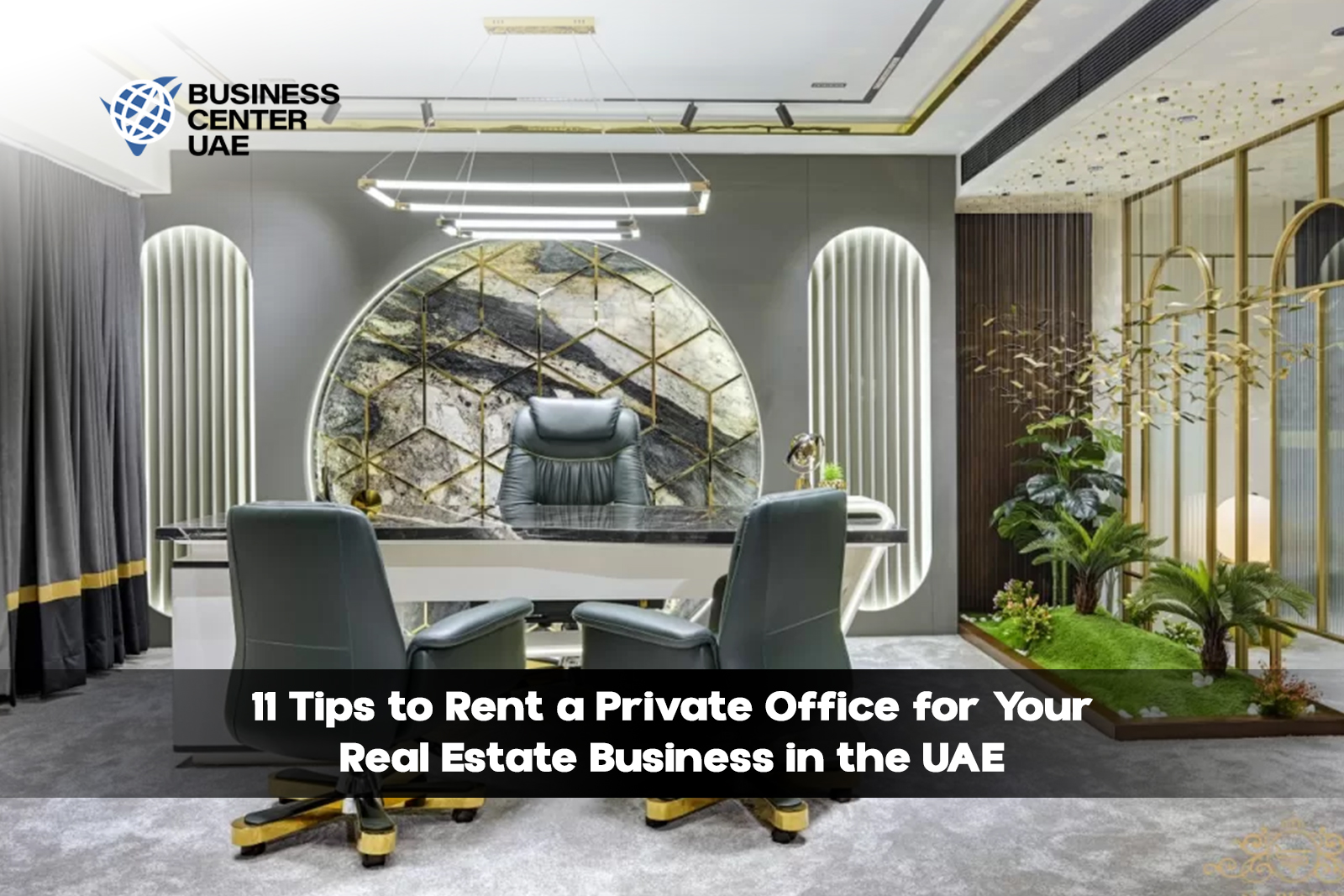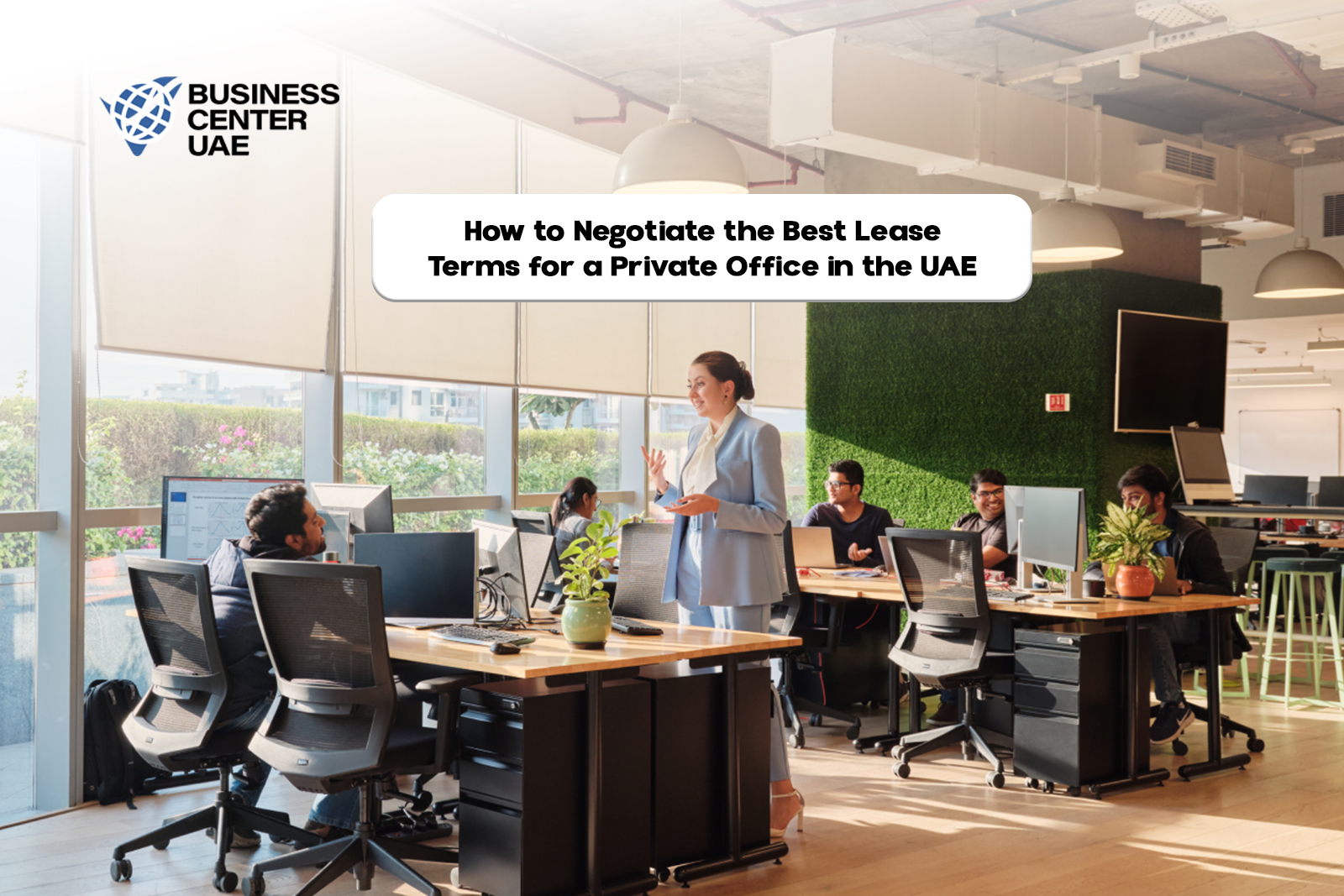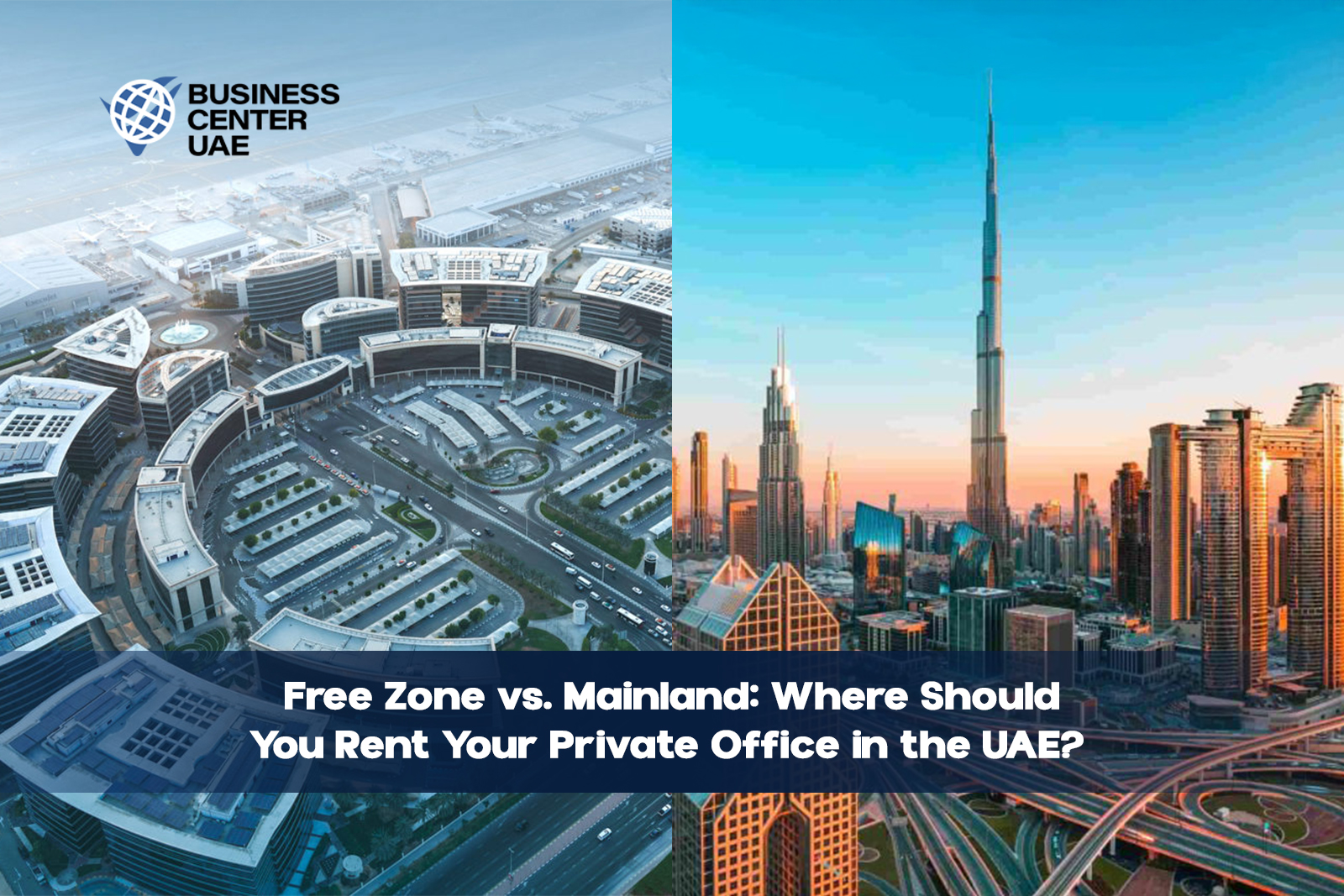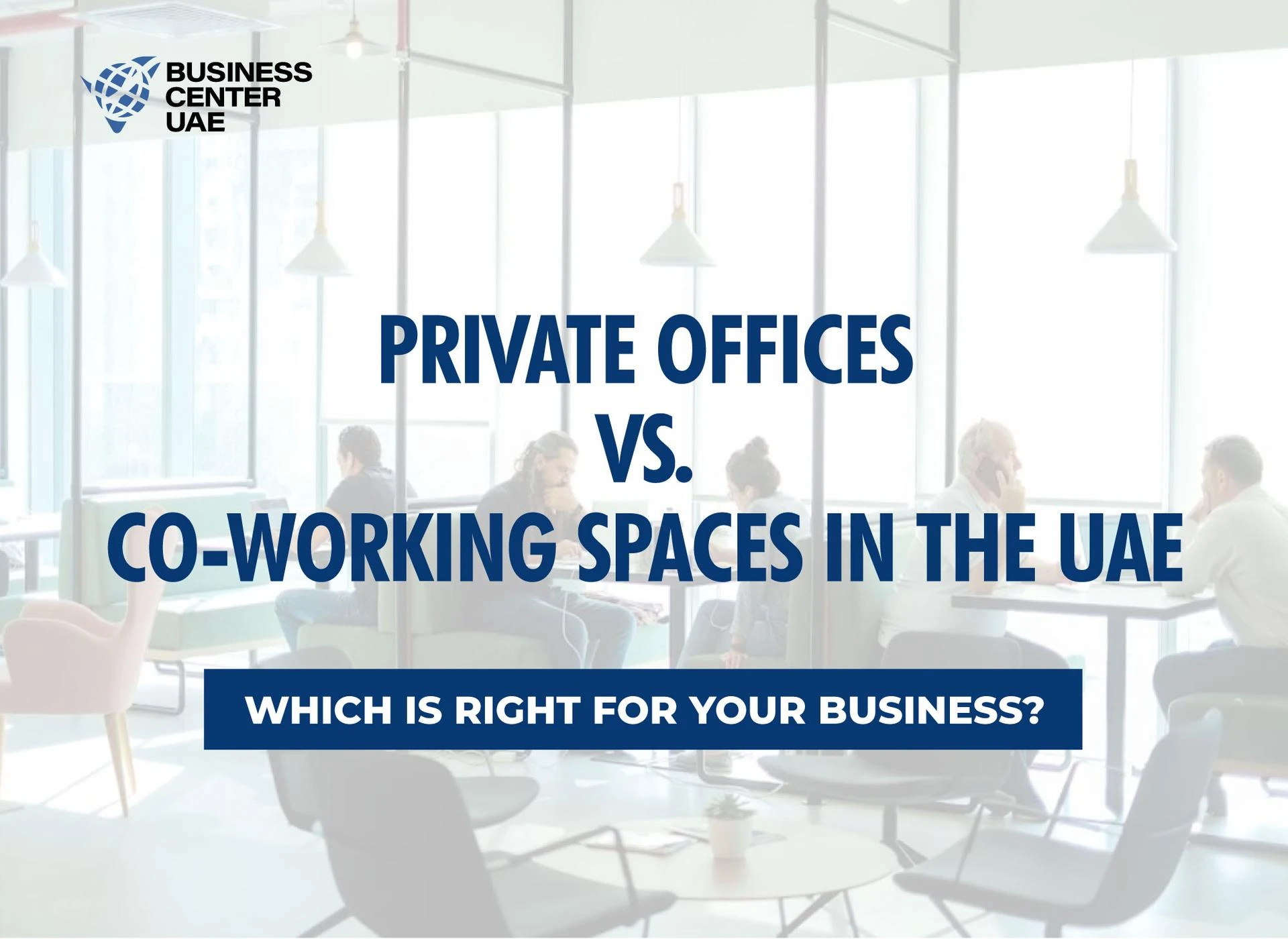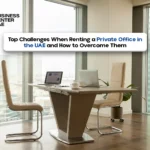Office space in the UAE isn’t just about desks and chairs; it’s a decision that shapes how your business is perceived and how fast it grows. The rise of flexible office solutions, from sleek private offices in downtown towers to buzzing co-working spaces in Dubai Marina, has transformed the traditional idea of renting office space.
Choosing between a private office space and a co-working space in the UAE isn’t just about rent or aesthetics. It’s about how your business operates, how your team collaborates, and what kind of impression you want to make on clients and partners. And with the UAE offering everything from serviced offices to shared workspaces, the decision requires more than a quick Google search.
In this blog, we’ll break down the real differences, key pros and cons, and what to consider when choosing between private offices vs. co-working spaces in the UAE, so you can make the call that fits your business, not just your budget.
Let’s get into it.
Private Offices vs. Co-working Spaces in the UAE: What’s the Actual Difference?
To make the right choice for your business, you need to understand how these two workspace models actually function, beyond just cost.
What You Get with a Private Office in Dubai
A private office space in Dubai offers exclusivity. You get a fully enclosed, lockable area for your business alone. It’s your team, your branding, your pace. No shared distractions, no worrying about who’s sitting next to you. These spaces often come as part of serviced offices in Dubai, where admin, utilities, reception, and even IT support are bundled into the rental.
Businesses that rely on privacy like legal consultancies, financial services, family offices, or luxury real estate brokerages gravitate toward private offices because confidentiality isn’t optional. Plus, you’re usually allowed to customise the space to reflect your brand identity, something you can’t really do in co-working environments.
Most private office rentals in Dubai are located in business districts like Business Bay, DIFC, or Sheikh Zayed Road – areas that also make it easier to get a professional license with the Dubai Economic Department (DED) or relevant free zone authority.
What Co-working Spaces in Dubai Actually Offer
Co-working spaces in Dubai are built around flexibility and collaboration. You get access to a shared workspace, typically a hot desk or a fixed desk, alongside professionals from different companies and industries. The environment is designed to spark interaction, whether it’s through open-plan layouts, community events, or casual breakout zones.
For startups, freelancers, or solo entrepreneurs, this kind of shared office space in the UAE is a cost-effective way to get started. You don’t commit to long leases, you don’t deal with furniture or fit-outs, and you get immediate access to business infrastructure. Most packages are monthly, and include essentials like Wi-Fi, printing, and meeting room access.
Neighbourhoods like Dubai Marina, JLT, and Al Quoz have become hotspots for these coworking spaces, especially for creative and tech-driven businesses. These areas combine affordability with a vibrant work culture, which is why they’re also popular among digital nomads and remote teams.
The Core Differences
Here’s the thing. If your business needs privacy, consistency, and a dedicated space where you can build long-term operational structure, a private office is more aligned with your needs. If your priority is agility, lower costs, and being in a collaborative setting, co-working is the better fit.
Private offices in Dubai typically come with more licensing compatibility. For example, if you’re applying for a DED mainland license, you’ll likely need a dedicated tenancy contract. Co-working spaces, on the other hand, often operate with flex licensing from free zones, which is fine for certain business models but restrictive for others.
Also, flexible office space in the UAE is not just about square footage. It’s about how that space works for your client meetings, your team productivity, and your long-term growth.
Factors to Consider
Not all businesses have the same operational rhythm, space needs, or licensing requirements. So, before you pick between a private office rental in Dubai and a coworking space, here’s what you should factor in.
1. Freelancers and Solo Entrepreneurs
If you’re working independently, especially in creative or digital fields, a coworking space in Dubai Marina or JLT gives you structure without long-term costs. You’ll meet other professionals, plug into a community, and keep overheads low. Bonus: Many free zones offer flexi-desk license packages tailored for this setup.
2. Startups and Small Teams
Early-stage teams can benefit from the flexibility and low commitment of shared office spaces in the UAE. Co-working helps you scale up or down quickly, test ideas, and avoid being locked into a commercial lease before you’re ready. However, if you’re applying for a mainland license or expect frequent client meetings, consider moving to a serviced private office.
3. Legal, Finance, and Consultancy Firms
Privacy, professionalism, and regulatory compliance are non-negotiable here. You’ll need a private office space in Dubai, preferably in business hubs like DIFC or Business Bay. These come with the infrastructure and prestige needed to support your image, attract clients, and meet DED or DFSA requirements.
4. Tech Companies and Digital Agencies
If you’re building a product, managing distributed teams, or working on agile sprints, a flexible office space in the UAE can serve you well. Some companies start in coworking spaces for ecosystem access, then shift to a private setup once they scale or need full-time team focus.
5. International Branches and Family Offices
These setups usually require a secure, dedicated location to build long-term trust. A private office rental in Dubai offers the environment needed for confidential discussions, legal work, and multi-jurisdictional planning. Shared spaces often fall short here in terms of both image and privacy.
Cost Comparison and Licensing Implications
Let’s be real: cost is a big factor.
But in the UAE, the price you pay for office space isn’t just rent — it directly affects your license type, visa eligibility, and business operations.
1. Coworking Spaces: Lower Upfront Costs, But Not Always Cheaper
Coworking spaces in Dubai generally offer monthly packages starting as low as AED 500 to AED 1500 for a hot desk. Some free zones bundle a flexi-desk option with a trade license, making it a cost-effective choice for freelancers or small service businesses.
But here’s the thing — you may hit limitations:
- Some authorities cap the number of visas you can get with a flexi-desk.
- Not all clients take businesses operating from hot desks seriously.
- Space can be shared, noisy, or inconsistent depending on the provider.
So while upfront costs are low, the long-term scalability may suffer.
2. Private Office Space: Higher Initial Investment, More Control
A private office rental in Dubai usually starts from AED 15,000/year for small spaces, going up significantly depending on location, fit-out, and amenities. You’ll also need to factor in:
- DED or free zone license fees
- Ejari registration (if on the mainland)
- Utilities and office setup (unless it’s a serviced office)
But the upside? You get:
- Better eligibility for visas (based on square footage)
- A physical address for regulatory compliance
- A more professional setup that builds client trust
If you’re serious about staying long-term or working with government entities, private office space in Dubai becomes more than a cost — it’s part of your positioning.
3. Business Centre Trade-Offs
Some business centres in Dubai offer a hybrid: small serviced offices that include reception services, meeting rooms, and admin support. These can be a middle ground — not as communal as coworking, but not as expensive as leasing a large private space.
Just make sure the business centre is approved by the relevant licensing authority. Not all locations are accepted for every activity or visa application.
Which Office Setup Is Better for Growth, Compliance, and Branding?
Let’s look beyond square footage and rent. Your office setup shapes how your business grows, how compliant you stay, and how clients perceive your brand.
1. Compliance: What the Regulators Expect
If you’re setting up in a Dubai mainland jurisdiction (like under the DED), your office must meet minimum space requirements — usually 100+ sq ft — to qualify for more than one visa. You’ll also need an Ejari-registered office lease.
That means:
- Coworking spaces may not qualify unless the provider has approval and issues a valid Ejari.
- Private offices, especially those in approved buildings, make compliance smoother — especially for businesses in real estate, law, or finance.
In free zones, the rules vary. Some allow flexi-desks with zero visas. Others require a private cabin for team expansion. If you plan to hire or sponsor employees, private office space in a UAE free zone will save you future headaches.
2. Growth Potential: Can You Scale from Here?
Here’s where the gap widens.
- Shared office space in UAE is great for solo founders or early-stage startups. But the minute you add a team, hold frequent meetings, or need storage, it becomes limiting.
- Private office rentals in Dubai offer room to grow — literally and operationally. You control access, layout, work hours, and can brand the space to reflect your company culture.
Some coworking providers do offer scale-up options (larger cabins, team rooms, etc.), but check availability and costs before you commit. Not all spaces are future-proof.
3. Branding and Client Experience
Imagine walking into a bustling coworking lounge vs. being greeted by your company’s logo on a glass door.
- In industries where trust and credibility matter — like consulting, law, finance, or real estate — a private office setup creates stronger impressions.
- Serviced offices in Dubai can be a good middle ground if you want a sleek look without managing utilities, maintenance, or staff.
Meanwhile, coworking spaces may align better with creative agencies, tech startups, and freelancers, where community and collaboration are key.
So, Which One Is Right for You?
It really comes down to where you are and where you’re heading.
Choose a coworking space in Dubai if:
- You’re a solo founder, remote worker, or freelancer
- Flexibility and affordability matter more than privacy
- You want to be surrounded by a creative, startup-friendly environment
- You’re testing the waters before committing to a full office
Go for private office space in the UAE if:
- You need a physical office to meet licensing or visa requirements
- You’re building a team and need dedicated space
- Brand perception, confidentiality, and client trust are essential
- You’re ready to scale and want full control over your workspace
No matter what you pick, location, licensing requirements, and long-term plans should lead your decision. Not just rent.
At Business Centre UAE, we offer fully serviced private office spaces tailored for startups, consultants, and growing businesses that want a professional, compliant, and focused work environment in Dubai.
If you’re weighing up office options, skip the guesswork.
Let’s talk. We’ll walk you through what’s required for your business activity—and how a private office can support your licensing, operations, and growth.
Business Centre UAE — Your business setup, simplified.



